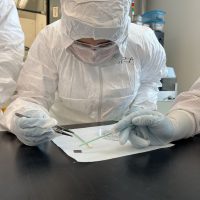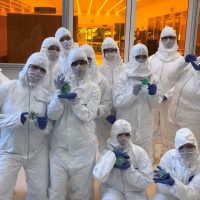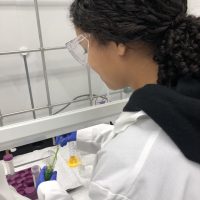There’s a good chance many Middle Tennessee high school kids know more about nanotechnology than you do thanks to the Vanderbilt Institute of Nanoscale Science and Engineering, which has been making strides in its educational outreach for more than a decade.
VINSE’s mission is to drive innovation in science, nanotechnology and education that benefits society.
“We take the immersive education and outreach component of our mission very seriously,” said Sharon Weiss, VINSE director, Cornelius Vanderbilt Professor of Engineering, professor of electrical and computer engineering, and professor of materials science and engineering. “Over the past 15 years, we have positively impacted more than 45,000 students from 26 counties in Tennessee with our nanoscience outreach activities. One of the important components of VINSE K-12 outreach is the VINSE High School Field Trip Program.”
On Oct. 17, the program marked its 200th high school field trip, introducing more than 3,500 regional high school students to the wonders of nanoscience.
During the field trips, students engage in activities such as using blackberry juice to craft solar cells, examining material using a scanning electron microscope, or donning a special gown to work inside the VINSE state-of-the-art clean room.
The field trips started in 2011, with support from TN-SCORE, a state program funded by the National Science Foundation aimed at enhancing energy-related research and education throughout the state. While TN-SCORE funding concluded in 2016, Vanderbilt stepped in with additional support, enabling the program to expand its reach from 10 to 30 schools annually.
VINSE collaborates extensively with about 30 departments across Vanderbilt and Vanderbilt University Medical Center, as well as other academic institutions and industry partners. This interdisciplinary approach extends to their outreach efforts, too.
“When hosting school groups, we align activities with both the institute’s mission and the students’ learning objectives. We emphasize the significance of nanotechnology to inspire future STEM careers,” said Sarah Ross, VINSE senior program manager. Ross has coordinated the VINSE outreach program since its inception.
Feedback from educators has been overwhelmingly positive, with many who have been involved since the beginning returning eagerly each year.
“VINSE provides my students with a glimpse of advanced technology and its capabilities by showing them college-level labs, the electron microscope, and the clean room. They are awed and amazed,” said Mechelle Fralinger, head of the science department at Gallatin High School.
“Once we open our schedule, spots fill up quickly,” Ross said. “We recently introduced a new forensics lab for the 2023–24 academic year, and the response has been astounding—we’re already fully booked with a waiting list.”
During the forensics lab program, students will solve a whodunnit-themed activity using photoluminescence and several types of spectroscopies. They will also extract chlorophyll from spinach, analyze perfumes and take spectra on different jewelry.
VINSE also launched their new NanoGuides initiative this autumn. This initiative provides training for graduate student volunteers to lead many of VINSE’s STEM outreach activities and formally recognizes their passion for science outreach.
“It’s fantastic to engage our Vanderbilt students in outreach and service learning, especially in programs like the VINSE high school field trips, which offer hands-on learning designed to inspire K-12 kids to pursue careers in engineering and science,” Weiss said.
VINSE outreach has real-world impact. Take the case of Joshua Ryan Nolen, who participated in a VINSE high school field trip in spring 2012. He pursued a summer research internship at VINSE and later earned his Ph.D. in interdisciplinary materials science from Vanderbilt. Today he is an adjunct professor and collaborates with a VINSE faculty member on a start-up derived from Vanderbilt research.
As VINSE looks to the future, the team remains committed to assessing and refining their outreach program, ensuring that the next generation remains inspired and informed about the wonders of nanoscience.


